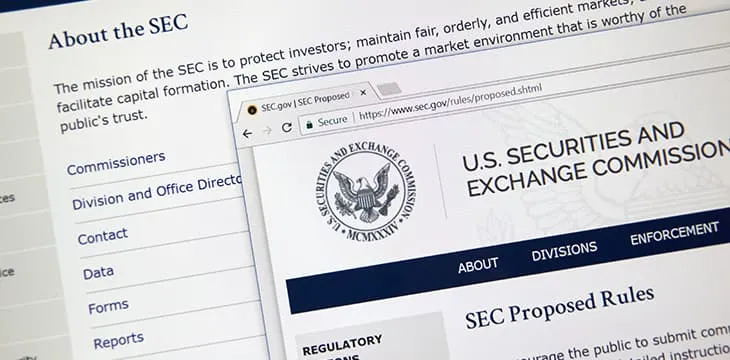|
Getting your Trinity Audio player ready...
|
The U.S. Securities and Exchange Commission (SEC) is charging blockchain content publishing platform LBRY, Inc. with conducting an unregistered offering of digital asset securities. The charges stem from a 2016-20 token offering the SEC says raised US$11 million for the company.
The charges are the latest in an ongoing regulatory crackdown on token sales during the “ICO craze” of the past few years. After blockchain token creation became easily accessible, thousands of projects launched and sold tokens, ostensibly to fund building. The SEC says many, if not most, of these token offerings constituted unregistered securities in which U.S. investors would reasonably have expected a return.
New Hampshire-based LBRY, which developed the video sharing platform Odysee, sold over 13 million of its “LBRY Credit” (LBC) tokens over that four-year period on two online trading platforms. It received BTC for the sales, then worth around US$5 million.
Odysee allows viewers to “earn cryptocurrency for watching videos” and has a large selection of content, with plenty of active users. LBC tokens (still traded on CoinEx and Bittrex) are currently worth around 20 cents, having dropped from 28 cents in the past 24 hours. Immediately after their launch, LBC assets were worth US$1.60 (their all-time high) and at two other points between then and January 2018, reached $0.86 and $1.29.
The SEC’s complaint against LBRY
According to the SEC’s complaint, it also made an early offer to sell discounted LBC directly to institutional investors—but decided against this and took investment funding from venture capitalists instead. The company, it claims, later sold batches of LBC to investment funds and retained a majority of the tokens itself. LBRY had allegedly represented to both investment funds and retail traders that the value of their tokens would increase in value once the LBRY Network grew.
These circumstances would define the tokens as securities, which LBRY had failed to register as such at any point, contravening Sections 5(a) and 5(c) of the 1933 US Securities Act, it said. It is asking for the court to order LBRY to cease trading LBC assets, “disgorge its ill-gotten gains” and pay an additional civil monetary penalty.
The responses
LBRY, Inc. has strongly disagreed with the charges, launching an online campaign and petition called “Help LBRY Save Crypto.” It called the SEC’s definition of blockchain tokens as securities “aggressive and disastrous” and “a bureaucratic nightmare,” which would put the entire blockchain industry at risk in the United States and hand more power to Big Tech and Wall Street.
Aren't You decentralized? What's the problem?
— luigitecnologo (@luigitecnologo) March 29, 2021
Unlike many other token-based projects of the same period, LBRY did produce a working product that still exists today. This, along with its #helplbrysavecrypto hashtag campaign on Twitter, has seen it gain some sympathy and support from blockchain social media.
https://twitter.com/LoveBitcoinSV/status/1376691430761000964
Tokenized CEO James Belding, whose protocol operates on the Bitcoin SV (BSV) network, called LBRY’s share of its own tokens a “pre-mine”—a somewhat less-sympathetic term in the blockchain world that has become synonymous with token-based get-rich-quick schemes in which project founders make millions (or even billions) for themselves.
The SEC is starting to take action against issuers of 'decentralized' networks that utilize pre-mining.https://t.co/Ge2ziT6UMx
— James | Tokenized.com (@JamesBelding) March 29, 2021
LBC’s price gains (and falls) between 2016-18 were likely due to speculative mania that drove all digital asset prices up, though many who bought LBC at its peaks and still hold it would be well underwater today (to be fair, the LBC price was only $0.01 in January 2017 and $0.14 in October that year). There has been both a price rise and a large increase in trading activity for LBC since December 2020.
Regardless of profits, losses and online campaigns, it has become clear the SEC regards many blockchain token offerings as securities under its rules. If it determines the project operators had suggested investors would earn returns from their token purchases, it intends to pursue and penalize operators even if their actions happened years in the past.
For this reason, it’s important that all those testing or creating transferable tokens on BSV platforms to be aware of these regulations, and realize that any speculative price gains could someday result in scrutiny from the authorities. The BSV industry has promoted a responsible approach to tokens, but the technological freedom to create an asset still has consequences that cause many to disregard them.
Follow CoinGeek’s Crypto Crime Cartel series, which delves into the stream of groups—from BitMEX to Binance, Bitcoin.com, Blockstream, ShapeShift, Coinbase, Ripple and
Ethereum—who have co-opted the digital asset revolution and turned the industry into a minefield for naïve (and even experienced) players in the market.

 07-06-2025
07-06-2025 





